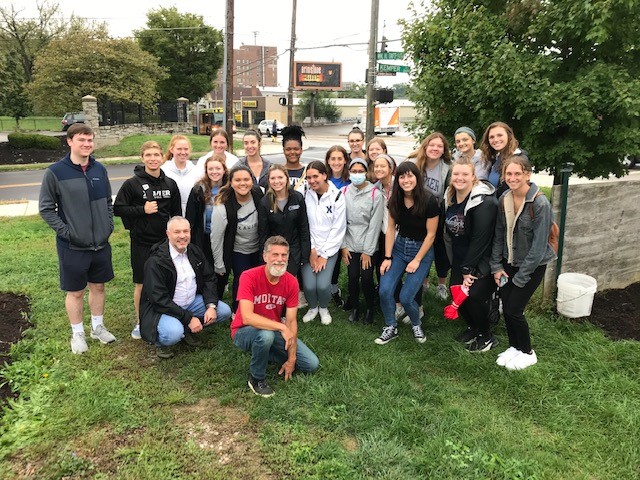HESA 245: Introduction to Population Heal

 <
<
Course: HESA 245 - Introduction to Population Health
Professor Victor Ronis-Tobin
HESA 245 Intro to Population Health, is a foundational course for Xavier’s Population Health Minor that introduces undergraduate students from any discipline to the concepts, methods, and career paths in population health. The course teaches content and skills related the practice of population health. Professor Victor Ronis-Tobin wanted to connect conceptual learning in this course by bringing students to places where people do not have access to many health-based resources.
“The course focuses on addressing population level health risk factors, through prevention, both primary and secondary- before people get sick (primary), and while they are sick (secondary), to improve outcomes (better health),” said Ronis-Tobin. “The focus is on the group instead of an individual.”
As part of the course students participated in an immersion in nearby Walnut Hills, a diverse, historic community, to meet with community leaders, nonprofits, and residents, and observe community-led interventions that address health inequities. The students’ walkabout included a tour of innovative nonprofit LaSoupe, a visit with staff who support the Freestore Foodbank’s Healthy Harvest Mobile Market every Friday in Walnut Hills, and a visit to one of the neighborhood’s six urban gardens.
Cameryn Reilman reflected after the immersion:
“Prior to the immersion experience, I had never walked through Walnut Hills. I had a preconceived notion that swayed my opinion of the neighborhood. This immersion experience allowed me to embrace Walnut Hills with an open mind and see both the good and bad.”
As part of their community engagement, students had a chance to meet with several community leaders who shared insights into issues facing the community including Dr. Anna Goroncy, who serves on Walnut Hills’ Health Committee and advocates for Covid vaccine access, Gary Dengel with the Walnut Hills Redevelopment Foundationwho coordinates responses to food insecurity issues, and Rico Blackman of the Black Power Initiative, a new nonprofit designed to empower African American residents through leadership and supportive resources.
Student Colleen Concannon summarized her contextual experience following the immersion:
“We encountered many different social determinants of health “problems” in Walnut Hills, ranging from decreased housing opportunities and social services to no grocery store. The different problems that we saw can affect individuals with economic stability, education access, health care access and quality, social and community context, and the neighborhood’s environment. This can lead to unhealthy living and cause other health related issues that could be prevented with just one grocery store in the center of the community.”
Intro to Population Health will be offered in the spring of 2022 for students who are interested in healthcare, nursing, social work, psychology, pre-med, and the Population Health minor.